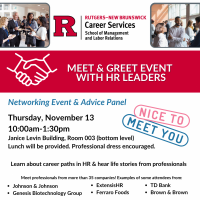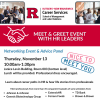


Join SMLR for our Lunar New year event on Tuesday, 2/17 in the Janice Levin Building Student Lounge on Livingston Campus.


Social drinking and/or eating is both a common human behavior and a verified network generator from a variety of social network research around the world. Yet, its causal consequences are not well-established empirical evidence. To fill in this gap, the present study is designed to examine the causal effect of social drinking/eating networks (SDENs) on measures of generalized and institutional trust. Ongoing analysis of data from the 2017 module of the International Social Survey Programme (ISSP) shows that there is a great variation in both measures of trust and an individual’s frequency of attendance to SDEN occasions across the 30 ISSP member countries/regions in Americas, Asia, and Europe.


Whether you're looking for a job, internship, or just want to practice networking with employers, we encourage all SMLR undergraduate and graduate students, and alumni to attend this event! Meet with employers to network & learn about opportunities at these various organizations. Recruiters attending would like to share opportunities at their organization.


Come and learn tips on how to ace your next interview!


Learn how to effectively search for a job or internship!


Come and learn how to network during the upcoming career fairs and networking events!


First impression matters- Get expert tips on professional attire and mastering the art of building your closet with a few staple pieces. Learn how to stand out and make a lasting impact on recruiters. Learn how to style using the platform. Join SMLR Career Services and take the first step towards your career success. Professional Outfits Available.


Join SMLR Careeer Services person or virtually to get your resume ready for upcoming career fairs or jobs/internships applications.


Join SMLR for our Friendsgiving event on November 17th!


Learn about career paths in HR & hear life stories from senior leaders via a panel discussion after networking!


